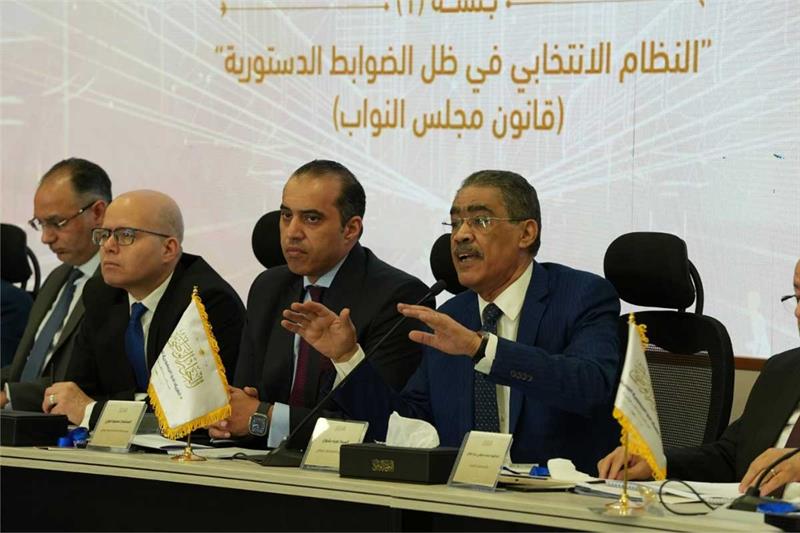
Diaa Rashwan, the National Dialogue's General Coordinator, speaking during the session of the Committee on Exercising Political Rights and Parliamentary Representation on Sunday. Official Facebook Page of the National Dialogue
During the dialogue session, Yasser El-Hudaybi, a member of the Senate from the Wafd Party, expressed his belief that the proportional list system (in which several parties are included in one list) is the best electoral system for parties.
El-Hudaybi, however, indicated that in light of the constitutionally stipulated quota, it would be better to adopt a system of 50 percent individuals and a 50 percent absolute closed list to represent the rest of the groups that are needed and that it is difficult to represent them in parliament.
Likewise, Alaa Abdel Nabi, representative of the Reform and Development Party, revealed that his party supports holding elections with a proportional list system.
“We support holding elections with a proportional list system, and with regard to the border governorates, we can solve this problem through reshaping the constituencies,” Abdel Nabi said.
Moreover, leftist activist Akram Ismail, and member of the under-establishment Bread and Freedom Party, explained that the proportional list “is the only system adopted by the world to establish a political space which strengthens the parties.”
Due to having weak parties, Ismail says, the proportional list qualifies them to grow and allows the people to see their programmes.
On the other hand, Ali El-Assas, a member of the House of Representatives for the Modern Egypt Party, stated during the session that the closed list system actually includes all sects of the Egyptian people.
“One of the disadvantages of the proportional list is that it allows party leaders to favour their relatives by pushing them to the top of the lists,” El-Assas said.
He declared his party’s agreement to hold the elections under the absolute closed list system.
Member of Parliament Mustafa Bakry also asserted his support of the closed list electoral system.
Any successful electoral system is characterized by consensus on its regulating law, ease of application, and its support of the party system, Bakry continued.
Bakry further asserted that the Constitutional Court has issued a decision invalidating proportional list election.
Moreover, Bakry added that the closed list resulted in everyone being represented in parliament and that the Majority Party only received 56 percent of seats with this system.
Should the system be proportional, “the heads of the parties will bring their children and their friends to appoint them,” Bakry stated.
In this regard, the closed list system provides representation for excluded groups, Egypt’s Republican People's Party representative Mohamed Salah Abu Hamila said in his support of the closed list system.
It allows parties to choose what can be represented in parliament, Abu Hamila continued.
There exists no ideal electoral system that can be implemented in all democratic countries, as each country has its own electoral system that corresponds with its own political situation, Abu Hamila asserted.
For his part, member of Parliament Amr Darwish proposed that there should be multiple electoral systems.
In Egypt's 2020 parliamentary elections, candidates competed for 568 seats in the House of Representatives, with 284 being elected under the individual system (independent candidates) in 143 electoral districts, and an equal number under the closed list system. In addition, this came along with the appointment of 28 members by Egypt's President.
According to the dialogue’s agenda, four sessions dedicated to the political track are being held on Sunday.
Two of the sessions will discuss the electoral system for the House of Representatives.
The third session will discuss the issue of eliminating all forms of discrimination as part of the Committee on Human Rights and Public Freedoms’ agenda.
The fourth session will focus on the challenges facing cooperatives as part of the Committee on Unions and Civil Society.
Short link: